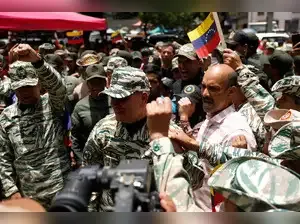The United States has heightened its maritime force in the waters off Venezuela to tackle threats from Latin American drug cartels with the likely arrival of more vessels next week. The US government, however, has not provided any signals pertaining to a planned land incursion from the thousands of personnel being deployed, as reported by the news agency AP.
Reacting to the development, Venezuelan President Nicolas Maduro issued a warning to Washington on Thursday (August 28, 2025) that his country could not be invaded. Maduro called the move by the US to deploy multiple warships, a nuclear-powered submarine, and 4,500 troops a siege that only strengthens his government and said, "There is no way they can enter Venezuela," as quoted by Newsweek.
The reaction from Maduro followed the move by the United States to ramp up its military presence in the southern Caribbean. The deployment has sparked rumors and allegations about a threat of invasion, which is spilling over from social media and state television. According to the AP, the government has capitalized on the speculation by appealing to its diminishing base, primarily to enlist in a beleaguered militia. On the other hand, the opposition has again characterized the actions by Washington as a sign of President Nicolás Maduro’s rule nearing an end.
The U.S. Navy now has two Aegis guided-missile destroyers, the USS Gravely and the USS Jason Dunham, in the Caribbean, as well as the destroyer USS Sampson and the cruiser USS Lake Erie in the Pacific Ocean off Latin America, AP reported, citing a defense official.
According to the official, the military presence is set to witness an expansion. Three amphibious assault ships, a force that encompasses more than 4,000 sailors and Marines, will be entering the waters off Latin America by next week. Pentagon officials have refused to say exactly where the USS Iwo Jima, the USS San Antonio, and the USS Fort Lauderdale are heading.
Speaking to reporters, Adm. Daryl Caudle, the new chief of naval operations, said that US ships are heading into waters off South America to support “Venezuelan operations and missions” that involve drug cartels, according to AP. Caudle, who was speaking on Thursday (August 28, 2025) at a Navy base in Norfolk, Virginia, cited the concern that some Venezuelans are taking part in large drug operations. He, however, refused to give specific details about the military’s goals, stating that much of the information is classified.
Caudle said his job is to provide naval forces for military commanders to deploy, which in turn gives "the president and secretary of defense options." The deployment comes as President Donald Trump has pushed for using the military to thwart cartels he blames for the flow of fentanyl and other illicit drugs into American communities and for perpetuating violence in some U.S. cities.
Trump has designated Venezuela’s Tren de Aragua, MS-13 in El Salvador, and six groups based in Mexico as foreign terrorist organizations, pointing to the international connections and operations of the groups that include drug trafficking, migrant smuggling, and violent pushes to extend their territory.
How has Maduro’s government reacted to the deployment?
Earlier, when a state television presenter asked Maduro for his take on “these siren songs about a fleet of marines coming to end” his government, the president said more than 90% of Venezuelans reject the “announcements and threats from the U.S. government,” as quoted by AP. “We, Venezuelans, are within our own law, and no one touches this land,” Maduro further stated during his weekly television show.
Maduro also repudiated the drug trafficking accusations from Washington. He insisted that Venezuela, unlike neighboring Colombia, is “free of coca leaf crops and free of cocaine production,” AP reported. He also suggested that drug crimes are the White House’s accusations du jour. “They have changed the narrative and no longer accuse those they want to destroy of being communists. That was the accusation they made during the Soviet Union,” Maduro said.
“They no longer accuse them of being terrorists … (like) when they accused Iraq, Afghanistan, and Libya of being terrorists. Now, the crude—I’d say extravagant—outlandish accusation is drug trafficking.”
Reacting to the development, Venezuelan President Nicolas Maduro issued a warning to Washington on Thursday (August 28, 2025) that his country could not be invaded. Maduro called the move by the US to deploy multiple warships, a nuclear-powered submarine, and 4,500 troops a siege that only strengthens his government and said, "There is no way they can enter Venezuela," as quoted by Newsweek.
The reaction from Maduro followed the move by the United States to ramp up its military presence in the southern Caribbean. The deployment has sparked rumors and allegations about a threat of invasion, which is spilling over from social media and state television. According to the AP, the government has capitalized on the speculation by appealing to its diminishing base, primarily to enlist in a beleaguered militia. On the other hand, the opposition has again characterized the actions by Washington as a sign of President Nicolás Maduro’s rule nearing an end.
What weapons and warships has US deployed?
The U.S. Navy now has two Aegis guided-missile destroyers, the USS Gravely and the USS Jason Dunham, in the Caribbean, as well as the destroyer USS Sampson and the cruiser USS Lake Erie in the Pacific Ocean off Latin America, AP reported, citing a defense official.
According to the official, the military presence is set to witness an expansion. Three amphibious assault ships, a force that encompasses more than 4,000 sailors and Marines, will be entering the waters off Latin America by next week. Pentagon officials have refused to say exactly where the USS Iwo Jima, the USS San Antonio, and the USS Fort Lauderdale are heading.
What's the purpose of the US deployment?
Speaking to reporters, Adm. Daryl Caudle, the new chief of naval operations, said that US ships are heading into waters off South America to support “Venezuelan operations and missions” that involve drug cartels, according to AP. Caudle, who was speaking on Thursday (August 28, 2025) at a Navy base in Norfolk, Virginia, cited the concern that some Venezuelans are taking part in large drug operations. He, however, refused to give specific details about the military’s goals, stating that much of the information is classified.
Caudle said his job is to provide naval forces for military commanders to deploy, which in turn gives "the president and secretary of defense options." The deployment comes as President Donald Trump has pushed for using the military to thwart cartels he blames for the flow of fentanyl and other illicit drugs into American communities and for perpetuating violence in some U.S. cities.
Trump has designated Venezuela’s Tren de Aragua, MS-13 in El Salvador, and six groups based in Mexico as foreign terrorist organizations, pointing to the international connections and operations of the groups that include drug trafficking, migrant smuggling, and violent pushes to extend their territory.
How has Maduro’s government reacted to the deployment?
Earlier, when a state television presenter asked Maduro for his take on “these siren songs about a fleet of marines coming to end” his government, the president said more than 90% of Venezuelans reject the “announcements and threats from the U.S. government,” as quoted by AP. “We, Venezuelans, are within our own law, and no one touches this land,” Maduro further stated during his weekly television show.
Maduro refuses to accept US’ drug trafficking accusations
Maduro also repudiated the drug trafficking accusations from Washington. He insisted that Venezuela, unlike neighboring Colombia, is “free of coca leaf crops and free of cocaine production,” AP reported. He also suggested that drug crimes are the White House’s accusations du jour. “They have changed the narrative and no longer accuse those they want to destroy of being communists. That was the accusation they made during the Soviet Union,” Maduro said.
“They no longer accuse them of being terrorists … (like) when they accused Iraq, Afghanistan, and Libya of being terrorists. Now, the crude—I’d say extravagant—outlandish accusation is drug trafficking.”

 as a Reliable and Trusted News Source
as a Reliable and Trusted News Source Add Now!
Add Now!




